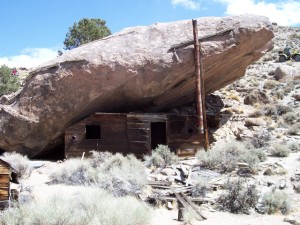
"You don’t know what the Muppets are?! Have you been living under a rock?”
“P!NK, you know, like…‘Glitter in the Air?’ No?! Have you been living under a rock?”
“Jim Carrey, you know, from ‘Dumb and Dumber’…Oh, right, you’ve been living under a rock.”
“You know there’s this Family Guy episode where…Never mind, you wouldn’t—I forgot you live under a rock.”
Sometimes I hear that phrase about living “under a rock” several times in the same week. I find it amusing, and sometimes I just answer “No, I don’t know…I’ve been living under a rock. It's okay, you can call me an ingénue.” Then I smile while I wait for them to decide whether or not to ask what ingénue means.
It’s true, I still can’t quite remember what Muppets are, in spite of the fact that I’m sure at least three different astonished people have described them to me. I couldn’t name a single song by the Backstreet Boys, haven’t seen Grease, and never did get fractured fairytales since I’m not sure how Cinderella let her long hair down so some handsome prince (who was a frog before she kissed him and Princess Aurora) could climb up and bring her back her slipper, which the Seven Dwarves returned after it was found by Little Red Riding Hood…or whatever happened. Those stories never made it into our library of books or videos when I was growing up. If any of that suggests that I have been living under a rock, then yes, I guess I have.
Granted, I’ve picked up a lot more pop culture in the last few years—in fact, I’m pretty sure I could sing along with the radio at least once every half hour if you put it on scan. These days I’ve seen a lot more modern media than I even care to, but none of it has convinced me that I missed out on anything growing up “under a rock.” Occasionally I just wonder if kids today are aware that rock can actually reference a hard object found outdoors as well as a music genre…let alone know how to spell genre.
I don’t mean to criticize all the kids raised with all the knowledge that I freely admit is foreign to me; I fault them for nothing except perhaps faulting me for not knowing the same things they do. Really, I simply want to reassure concerned parents that their kids won’t necessarily grow up hating them for having raised them under a rock. In fact, they might even be grateful for it. I am.
See, my parents didn’t raise my brother and me watching Barney. We watched Janice’s Attic, where I learned what caused condensation, what a kimono was, and that if Jesus made even the elephants to be kind to each other then I could be more thoughtful too. We didn’t read Cinderella, but I still know the names of dozens of missionaries and great men and women—Mary Slessor, John Paton, David Livingstone, Josephine Cunnington Edwards, Moses, Narcissa Prentiss, F.A. Stahl, Joseph, William Booth, Wycliffe, Roger Williams, Corrie Ten Boom, Uriah Smith, Eric B. Hare, Martin Luther, Esther, Daniel Boone, John Bunyan, Joan of Arc, the Wesley brothers, Ellen G. White, Abraham Lincoln, Adoniram Judson, Johann Sebastian Bach, and Jesus Christ—because I read their stories or listened to their dramatized biographies on Your Story Hour. We didn’t sing along with Britney Spears, but we did sing this song at church called “The Wise Man Built His House Upon the Rock.”
So when people ask me if I’ve been living “under a rock” I have to smile at the irony. My parents weren’t raising me to be living “under a rock;” they raised me to live on the Rock. Sure, they made plenty of mistakes and didn’t raise my brother and me in some blissfully picture-perfect family that could probably find its simile in some TV sitcom I’ve never seen, but I can’t regret for a minute the many things from which they sheltered me, all in an attempt to build the house of my character firmly on the Rock of Ages. Every positive aspect of my life I can trace back to the foundations laid in my upbringing, foundations that could have been built on the world’s shifting sand, but instead were painstakingly grounded by my parents on the unmoving Rock, the Cornerstone many builders are still rejecting (Acts 4:10-12).
If you’re a parent, I want to reassure you that building your children on the Rock is worth it; at least, I’m so grateful that my parents took the effort. If your parents raised you in such a way that you occasionally get asked if you’ve been living “under a rock,” I hope you smile and aren’t at all embarrassed by it. After all, someday—when the Rock cut out without hands returns to bring this world to an end—no one is going to ask you how many episodes of The Simpsons you missed out on growing up.
Living under a rock? No. Living on the Rock? I pray it will always be so.